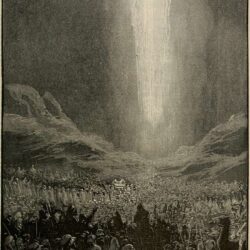| Source (Hebrew) | Translation (English) |
|---|---|
מִרְיָם הַנְּבִיאָה עֹז וְזִמְרָה בְּיָדָהּ |
Miriam, the prophet, strength and song in her hand. |
מִרְיָם תִּרְקוֹד אִתָּֽנוּ לְהַגְדִּיל זִמְרַת עוֹלָם |
Miriam will dance with us to increase the world’s harmony.[1] or “to swell earth’s song” according to the text in My People’s Prayerbook (Hoffman 1997). |
מִרְיָם תִּרְקוֹד אִתָּֽנוּ לְתַקֵּן אֶת־הָעוֹלָם׃ |
Miriam will dance with us to repair the world.[2] or “to redeem the world” according to the text in My People’s Prayerbook (Hoffman 1997). |
בִּמְהֵרָה בְיָמֵֽינוּ הִיא תְּבִיאֵֽנוּ אֶל מֵי הַיְּשׁוּעָה. |
Speedily in our life,[3] or “Soon in our day” according to the text in My People’s Prayerbook (Hoffman 1997). she will bring us to the waters of the redemption. |
These are the lyrics of the song, Miryam haNevi’ah, written by rabbis Leila Gal Berner and Arthur Waskow (with Hebrew by Leila Gal Berner) as found published in My People’s Prayer Book, vol. 7: Shabbat at Home, (ed. L. Hoffman, 1997), section 3, p. 189. The English lyrics are from an article published several years earlier — “Memories of a Jewish Lesbian Evening” by Roger McDougle appearing in Bridges (vol. 4:1, Winter/Spring 1994), on the top of page 58. No specific date is given for the havdalah program described in the article, alas. If you know the earliest reference for the publication or use of Miryam haNevi’ah, please leave a comment contact us.
The singing of Miryam haNeviah has been applied to the context of the Passover seder, between Barekh and Hallel as the pouring of the cups of Eliyahu and Miryam and the “shfokh ḥamatekha” declaration. In that context, Rabbi Dr. Leila Gal Berner writes:
Miriam the prophetess is linked with water in a number of ways. She watched over her baby brother Moses in the Nile and sang and danced at the shores of the Reed Sea. Midrash teaches us that when Miriam died, the magical, portable well that had sustained our people dried up.
According to tradition, Elijah will bring Messiah to us and the world will be redeemed. In my lyrics (below), Miriam brings us to the waters of redemption. It will then be our task to enter the waters and together redeem the world.
Instead of pouring out wrath, let us pour forth love, forgiveness and peace – for the soothing and healing of our broken world.
Source(s)
Notes

“מִרְיָם הַנְּבִיאָה | Miryam haNevi’ah, by rabbis Leila Gal Berner & Arthur Waskow (ca. 1994)” is shared through the Open Siddur Project with a Creative Commons Attribution-ShareAlike 4.0 International copyleft license.












Leave a Reply